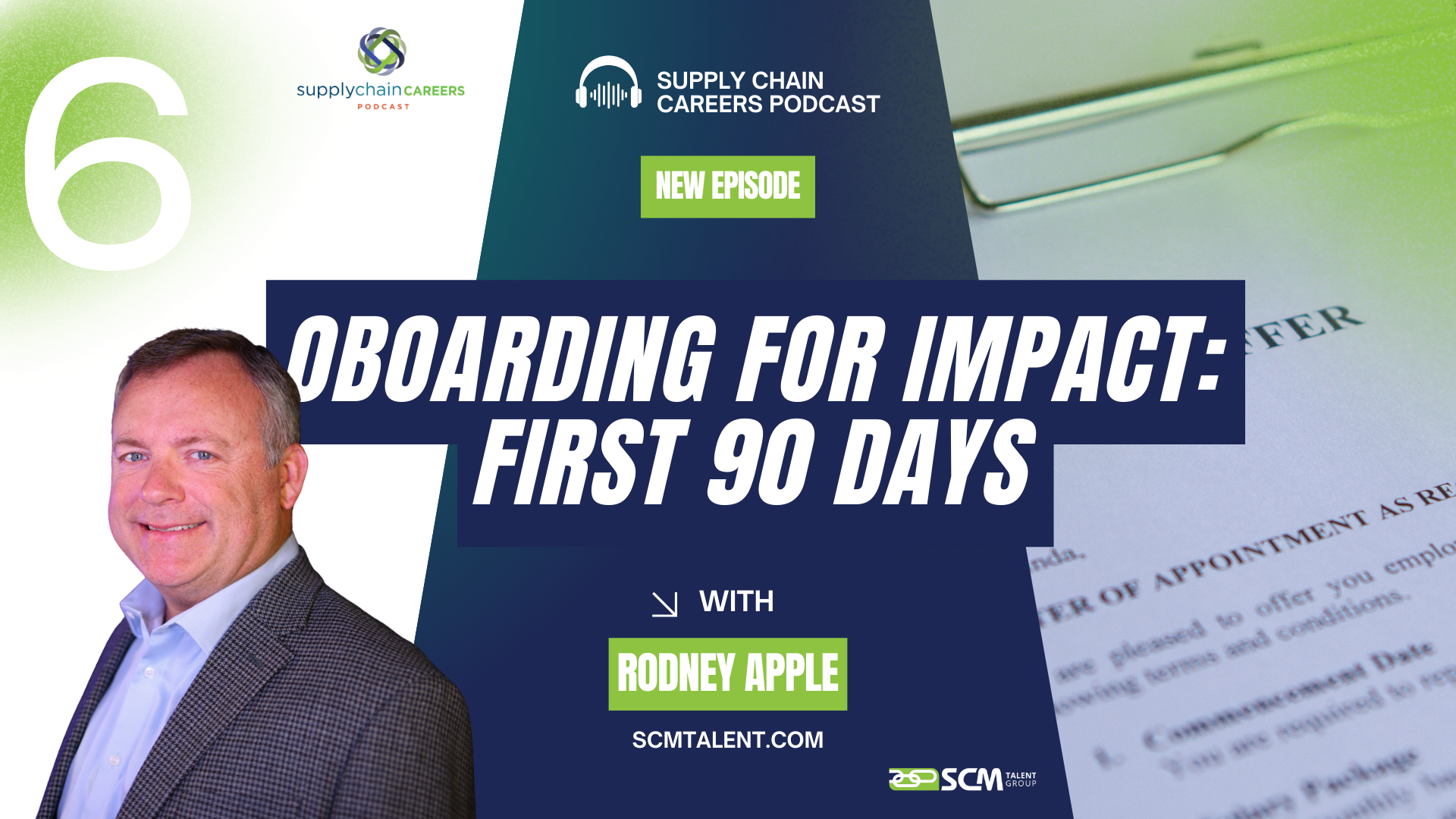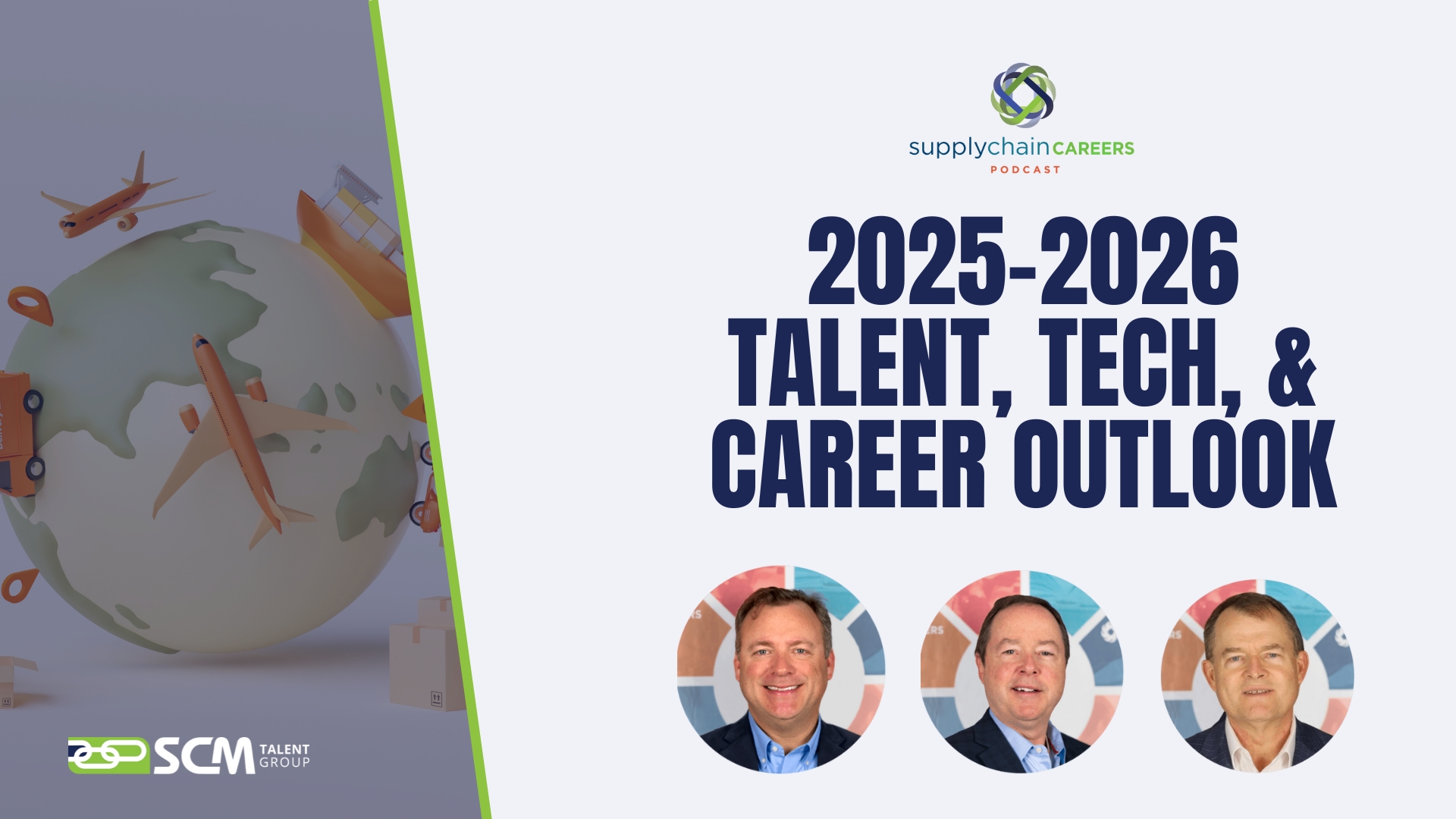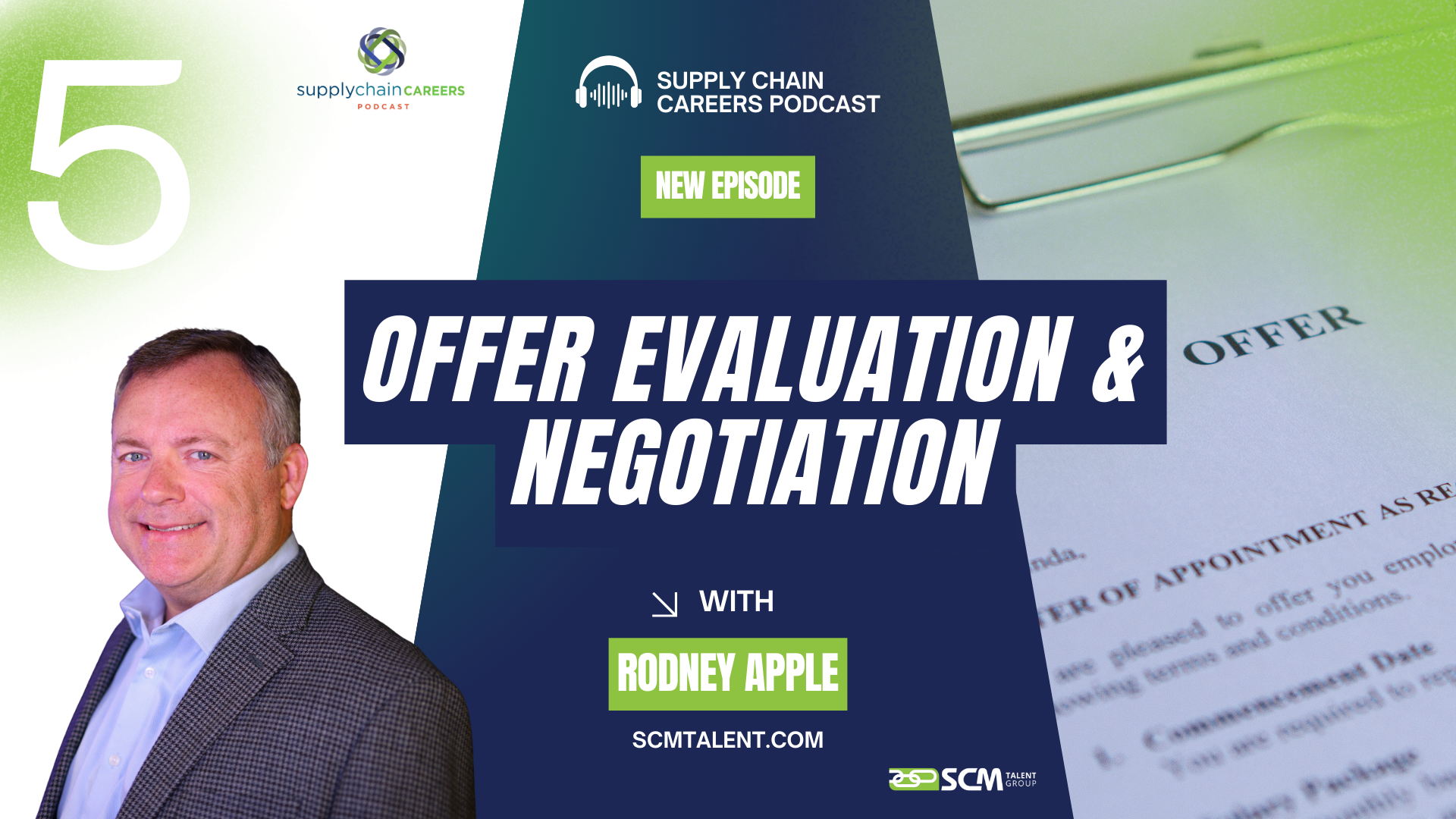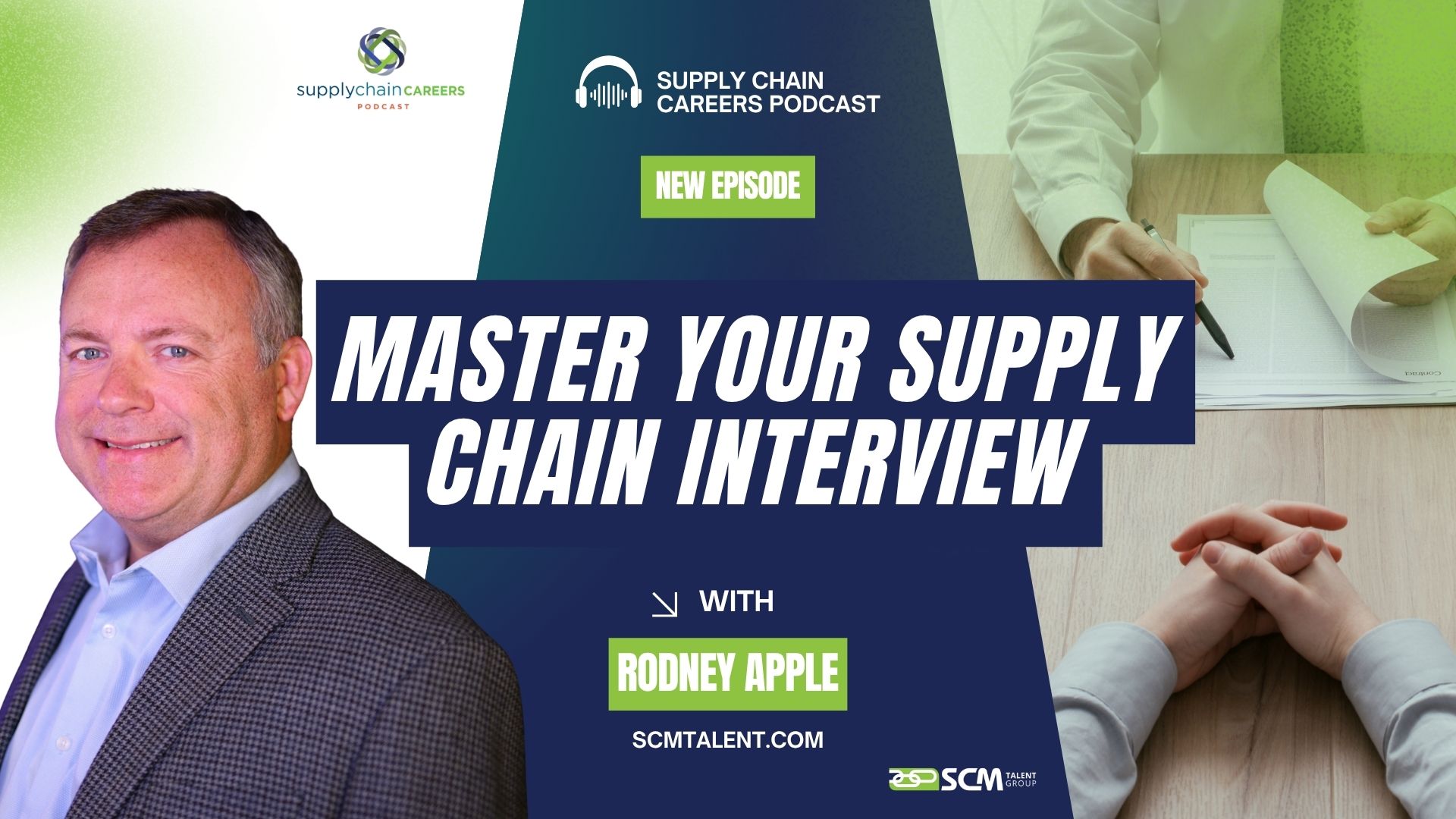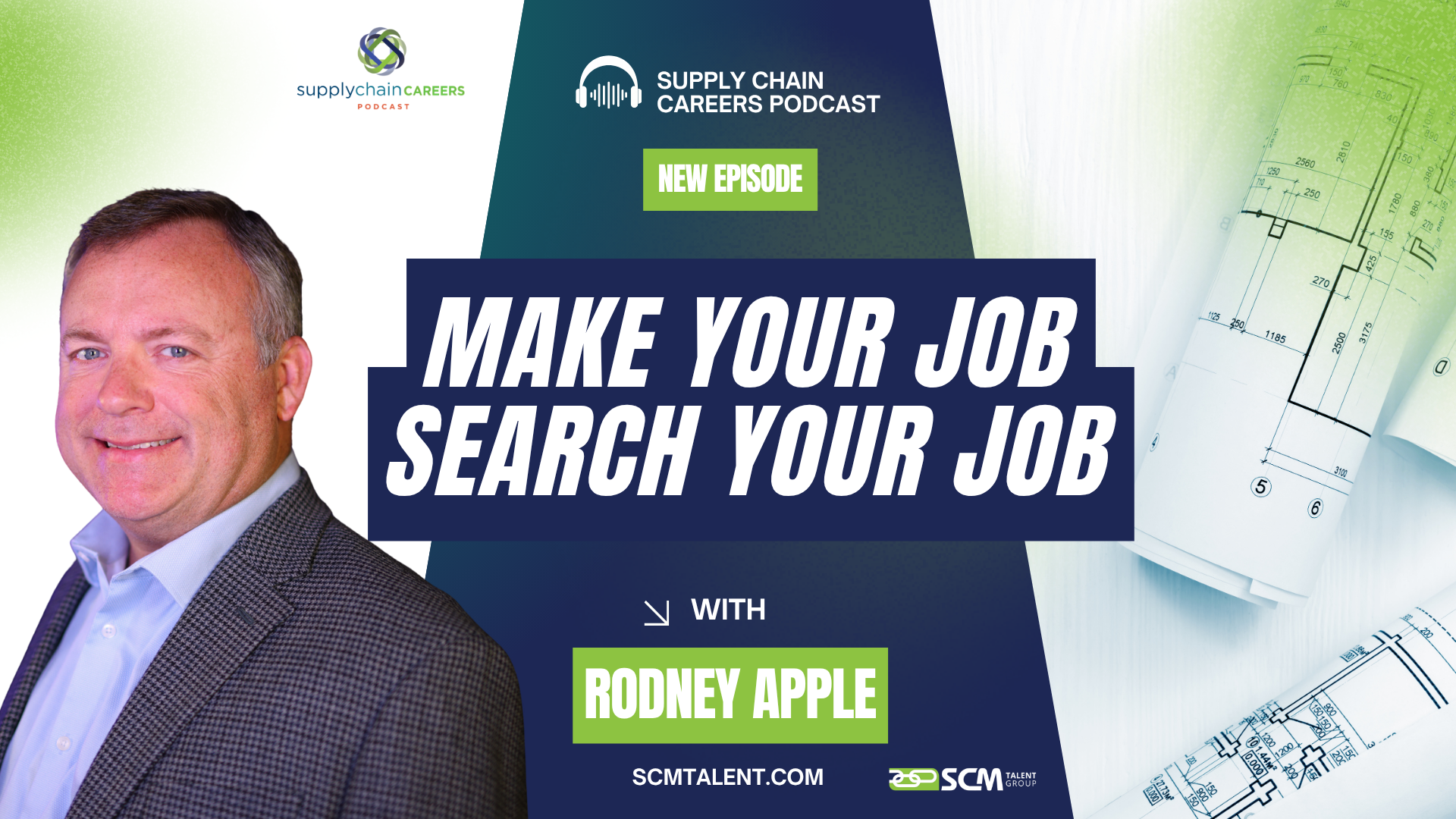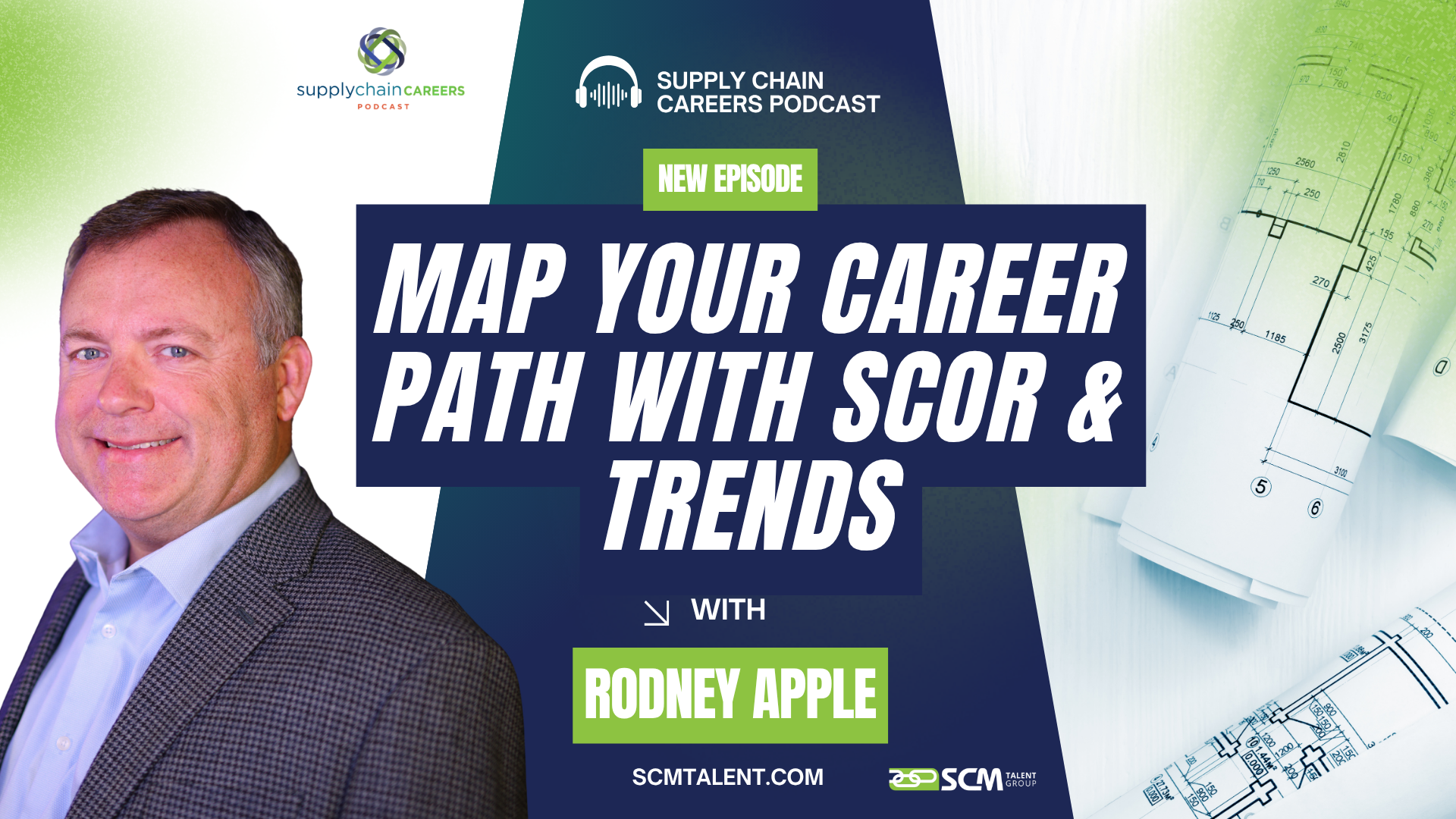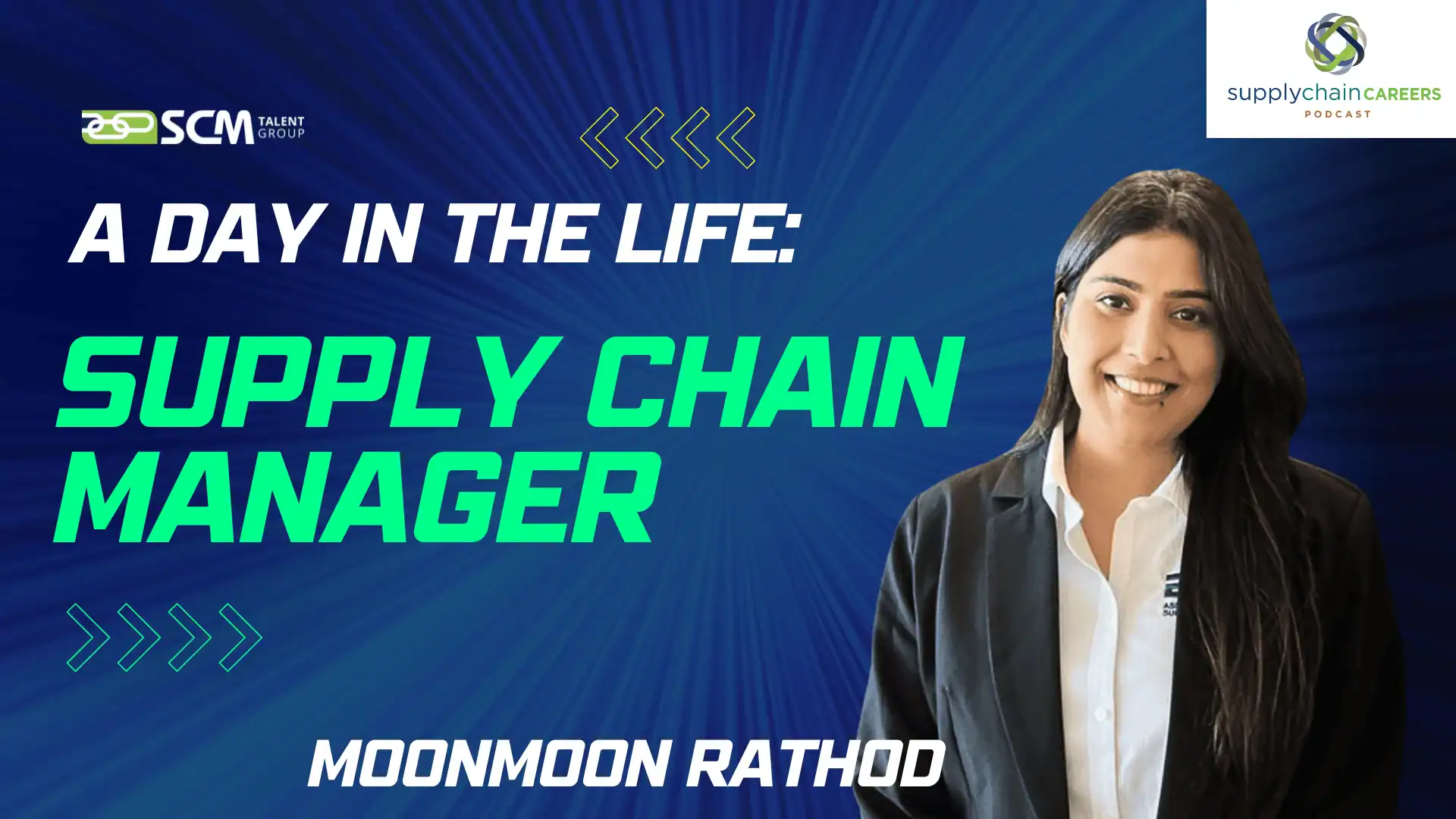
Podcast: A Day in the Life of a Supply Chain Manager – with Moonmoon Rathod
Hosts: Rodney Apple
In This Episode:
In the latest episode of the Supply Chain Careers Podcast, we go behind the scenes with Moonmoon Rathod, an emerging talent in global logistics and operations. With more than a decade of experience in leadership roles at organizations like Amazon, Apple, and Williams Sonoma, Moonmoon shares how she built a purpose-driven supply chain career and what it takes to succeed in this fast-moving field.
Her journey began with a game-changing internship that solidified her passion for the industry:
“It really started during my internship at Daimler Mercedes-Benz. I realized how much I enjoyed problem-solving, seeing the real-world impact of decisions, and working in such a fast-paced and dynamic field.”
Now a Senior Supply Chain Manager at Amazon, Moonmoon leads large-scale inbound operations by combining data-driven decisions with strong cross-functional collaboration.
“The data today is telling me what the story is. Based on that, I’m making decisions. That’s the biggest piece. Data is everything today.”
She stresses that success in supply chain isn’t just about technical proficiency—it’s about balance.
“Tools like Excel and SQL are your best friends. But beyond that, real-world experience managing suppliers or improving processes can be even more valuable than a master’s degree.”
When asked about career progression and industry change, Moonmoon emphasized the universal importance of a customer-first mindset:
“Whether you’re shipping a car part or delivering a package, it all comes down to meeting customer expectations—with quality and care.”
Finally, she offered this key piece of advice for those looking to break into or grow within the field:
“Shadowing someone in your field or trying different teams for a few months can be a huge win. Supply chain is so broad—you don’t know what excites you until you try it.”
Whether you’re a student, a career switcher, or a seasoned professional, Moonmoon’s story is a reminder that supply chain careers are full of opportunity, challenge, and impact—especially for those who stay curious, data-savvy, and adaptable.
Who is Moonmoon Rathod?
Moonmoon Rathod is an award-winning supply chain leader with over 10 years of experience in logistics, operations, and business transformation, having worked with global organizations like Amazon, Apple, and Daimler Mercedes Benz.
She is actively involved in mentoring and community initiatives, serving on the Board of ASCM South Central Texas and championing diversity through Women at Amazon, TX. As a recognized thought leader and speaker, Moonmoon shares her expertise in driving operational efficiency and excellence across the industry. A strategic innovator, she is shaping the future of supply chain practices on a global scale, making her one of the most promising young leaders in the field.
This podcast is made possible by SCM Talent Group. The industry leading supply chain executive search firm. Visit SCM talent [email protected].
[00:00:47] Rodney Apple: Welcome to the Supply Chain Careers podcast, our special series a day in the life of a supply chain professional. I’m Rodney Apple, your host, and in this series we’re gonna provide some unique. First person insights from supply chain professionals and executives cutting across a wide range of industries.Let’s dive in today, our guest is Moonmoon Rathod. Moonmoon is a pleasure to have you on the program today.
[00:01:16] Moonmoon Rathod: Hello, Rodney. Thank you so much for having me on the podcast. I’m a senior supply chain manager with Amazon, and I’m excited to be here today. Share my story, my journey, and my experiences in the field so far. [00:01:29] Rodney Apple: Excellent. Thank you again for making the time, man. So we’ll go ahead and get started. First question is, we’re gonna do this as a day in the life of a supply chain manager. So we loved how you got started on this career journey. How long have you been working in this particular field? What led you to pursue a career in supply chain? [00:01:48] Moonmoon Rathod: Absolutely. I’ve been in supply chain for and logistics for over 10 years now, but it really started during my internship at Damo Mercedes-Benz. I. That experience completely shifted my career path. I realized how much I enjoyed problem solving, seeing real world impact of decisions, and working in such a fast paced and dynamic field.So I feel internships can truly show you what excites you and what doesn’t for me. That was the mark. It was clear to me that I wanted to be in logistics and supply chain that was the right fit. And since then, I’ve focused on building my expertise in this field from optimizing networks at William Sonoma or leading inbound strategy at Apple, or now at Amazon, where I work on large scale inbound operations.
That I think my internship was the first step that showed me the path to my career. And today I use a lot of data to drive efficiency, so that was also driven by my strong base from my internship roles and with a master’s in supply chain and years of hands-on experience. My passion has only grown, and I would say this field is always evolving and that constant change keeps me energized.
[00:03:06] Rodney Apple: Love it. Love it. I can hear the passion through the. Through your voice and yeah, I think you have to have that to work in this field. If you don’t, it’s, or any job really. If you don’t, it’s, it’s not gonna work out in the long term. You’ll eventually get burned out and [00:03:21] Moonmoon Rathod: absolutely [00:03:21] Rodney Apple: lose the faith and want to go and, and figure out what is the right move.So thanks for sharing that. And you’ve certainly worked for a who’s who. When you look at some of the logos that you’ve worked at for the companies you’ve worked for, taking a step back when you factor in things like soft skills and hard skills. I know in large companies, I learned early on that you have to have great communication and you have to work with a lot of different personalities and be able to work from the bottom level of the organization and Yeah, and be able to work up and influence and obviously outward externally with customers, suppliers, et cetera.
But from your own perspective, when you think about the roles you’ve worked in and leading up to this supply chain manager role, what are the core hard skills? We’ll start there that you need to be able to pick up and the all important soft skills as well.
[00:04:12] Moonmoon Rathod: Yeah, this is a great question. I would say to do well in this role or in a similar role like this, you need a good mix of technical and soft skills.You should understand logistics, data analysis, and forecasting. These are. I think the basis of everything that you do in this world. So tools like Excel and SQL are your best friends, but beyond that real world experience, basically managing suppliers or improving processes can be even more valuable than a master’s degree.
So soft skills matter as much. Also, communication, teamwork, making able to make a quick, like being able to make a quick decision. These are key things in this fast space. Fast space to um, space. And I would say to grow in supply chain, you need to stay adaptable. Always think ahead, look for ways to improve.
So yeah, I would say it’s, you need a good mix of technical and soft skills and yeah.
[00:05:16] Rodney Apple: Yep. Agree a hundred percent. And when you think about. The day to day. That’s what we’re trying to solve for in this series and convey to our audience. Yeah. Yeah. So we have a lot of folks from, I would even say high school into college that listen to this particular series.The, one of the biggest questions I get from, from folks at that level is, I don’t know where to start my career. Can you give me any advice? And I, mm-hmm. I tend to flip that back on them. And you need to develop like an understanding of what are the roles that are out there, and then. From there really get an understanding of each discipline, and this series is totally designed to get that.
But I would love to hear just from your own perspective, what’s it like in a day to day? Can you give an overview of your typical task? What are you trying to solve for? What are the goals, objectives for the role that you’re in now?
[00:06:08] Moonmoon Rathod: Yeah, I’ll, so my main goal in my current role is to drive efficiency and automation while building long-term improvements.Across like the logistics network? Sure. So every day starts with looking at performance data, what’s working, what’s not working for us, and using those insights to guide decisions. I work with different teams to solve challenges. It could be engineers, it could be the procurement team, it could be supply demand management teams.
It could be forecasting as an op teams, any of those teams, but like, but the performance today, like the data today is telling me what the story is. Based on that, I am making decisions. That’s the biggest piece. So data is everything today. And I would say there is a lot of like cross-functional collaboration in my work today.
So aligning priorities with different teams, solving risks early on, and keeping operations on track. So like some days it could involve like big picture planning, what’s our strategy, where are we headed? And then other days it could be like diving into the details. I would say my role currently is a very good mix of strategy and execution and supply chain.
No two days are the same ever. So it really depends on the day. But yeah, it’s strategy and execution driven both.
[00:07:29] Rodney Apple: Sure. And that makes a lot of sense as you move up. Especially the early junior part of your career. I think it’s important to distinguish as you move from entry level, junior level, you’re gonna start typically progressing from tactical mode into more strategic endeavors.And we know that supply chain has to interface, as we talked about earlier, internally, not only with your peers within your department, but you’re typically collaborating with other functions, other departments. Oftentimes externally, whether it be on the customer side or supplier side. In your role, what are the common stakeholders that you have to interface with internally?
And I was curious if you have to interface externally as well.
[00:08:15] Moonmoon Rathod: Sure. So internally I work with operations, finance, data science, engineering teams, and product teams. Even like when I say these teams, I literally mean like a generic word. There are multiple teams within these orgs too, and it’s all about working together to improve logistics, drive innovation, and align on key priorities.What is our goal? What are our priorities? And you don’t wanna boil the ocean. So having your priorities lined up is very important. Externally, I partner a lot with like suppliers, third party logistics providers and tech partners. Basically our goal as a company, and my goal in my role is to make supply chain more resilient, cost effective, and efficient.
So that could lead to like faster deliveries or it could lead to some cost savings, or it could lead to some efficient processes that, or we could like in, in terms of time savings. So I would say. With all these stakeholders, the most important pieces, strong communication, and it’s critical to keep a log of record and keep a, keep a log of things so that we can track everything and have things in order and to have it running smoothly.
[00:09:32] Rodney Apple: Absolutely. Yeah. Documentation of, of the work, project statuses, updates, all of those things are very important. Is there anything you’d add on to I. Going back to professional development is a follow up question. Keeping track of your accolades that you receive from others. Wow, you did a great job on this project.Moonmoon, obviously the KPIs, ultimately the value that you’ve created. So just anything you wanna share there for our audience that might be embarking on their first job outta school,
[00:10:03] Moonmoon Rathod: I would say be very open to ideas. A certain team may not sound exciting at first, but you never know until you interact with them.I would say be curious about your career in supply chain. Of course, internships I already mentioned, there are some, one more thing called this rotational programs or even shadowing someone in your field. I think that could give you a real sense of what the work is like. Um, and supply chain is so broad.
There are so many different areas. Planning, logistics, procurement, supply, demand, manufacturing, all of it. I would say shadowing or doing these rotational programs where you get to be in different teams. For like a couple of months. I think that would be a big, a huge win for someone new starting in this area.
And then they can decide what do they want to get into, what team excites them the most.
[00:10:53] Rodney Apple: Absolutely. That’s a great piece of advice is strive to be proactive as you look at whether it be internships, to your point, rotational, sometimes they’re called leadership development programs or you get to rotate.Yeah. Like you said, procurement, maybe for a few months you move into planning or out in the field and operations. So those are excellent pieces of advice for those that are early on in their career.
[00:11:19] Mike Ogle: During this short break, we recognize that this podcast is made possible by SCM Talent Group, the industry leading supply chain executive search firm.Visit SCM talent [email protected].
[00:11:36] Moonmoon Rathod: Awesome. [00:11:36] Rodney Apple: I’d love to hear what you enjoy most about your job. [00:11:40] Moonmoon Rathod: I would say I, I think I mentioned this earlier too, but I think I enjoy big, complex problems that really make a difference and like getting to solve it is incredibly rewarding to me. So optimizing how goods move around the world. I think toilet paper really put supply chain on the map for Leman. [00:11:58] Rodney Apple: Yes. [00:11:59] Moonmoon Rathod: Like that is when supply chain became so important for like day-to-day folks just to see like the impact of it, especially during COVID. So I think for me, what I enjoy the most is like seeing results of your work and at what scale it impacts it. I think I enjoy that. I also enjoy working with like different teams and using data to make smarter decisions.And the best part is it’s, it’s always, there is some drama always right? So it’s a very fast-paced, ever-changing nature of supply chain that keeps me on my toes. And I would say I genuinely enjoy it. Like today it’s tariff. Tomorrow it could be something else. So I enjoy the nature of it.
[00:12:43] Rodney Apple: Same here. I will echo that statement.It’s, it’s never a dull moment. Every day is different and there’s, there’s always a challenge ahead. And on that note, what are the typical challenges that, that you run into on a day-to-day basis?
[00:12:58] Moonmoon Rathod: Yeah, like, something I enjoy the most is also one of my biggest challenges. One major challenge is uncertainty in this world.Whether it’s like demand swings or supply disruptions, or. Unexpected weather or unexpected shipping delays, things can change pretty quickly and I think this is where like balancing long-term planning with the need to act fast is tough, especially when multiple teams are involved and like a company that is operating at this scale is moving their products and have their strategies in place.
So I would say driving improvements while making everyone is aligned with the ongoing challenge, that is the biggest with the ongoing challenge or the ongoing disruption is the biggest piece. But I think if you have a flexible mindset and strong communication, I think you can work through it.
[00:13:50] Rodney Apple: Absolutely. Yeah. You have to have some thick skin to, to work in the field. And patience and a growth mindset too. And never stop learning is, is a pretty common thing that we hear. Absolutely. ’cause based on how fast supply chain evolves, when you think about technology and automation and AI and robotics and all the cool things that exist within supply chain.Absolutely. And I, and it’s funny you mentioned COVID, and I think a lot of people when they supply chain’s, always had a bit of a branding and PR challenge in terms of being a newer field compared to legacy functions like sales and marketing and it. Yeah, COVID certainly was a wake up call. I think people don’t sometimes think about.
Where does the toilet paper come from? Yes, yes. Why is it on the shelf? And those swings could be, what do we call that? The bull whipp effect?
[00:14:38] Moonmoon Rathod: Yes. [00:14:39] Rodney Apple: Yeah. Then all of a sudden you have too much toilet paper and [00:14:42] Moonmoon Rathod: Absolutely. Yeah. So the holy [00:14:43] Rodney Apple: grail is trying to balance that out, right between supply demand and not carrying too much, not running out, and ultimately delighting the customer, getting that product when and where they want to receive it.Yeah. Yeah. Yep. When you think about career paths, we’d love to start with what career paths led you to the role that you’re in now, so folks can understand some of the foundational work that was involved to prepare you for the role you’re in now. And then where could you go? What are some of the common career paths that you would move to next from a role like a supply chain manager?
[00:15:19] Moonmoon Rathod: Yeah, I’ll answer both the questions. First is like in this space there are a lot of directions you can go into. Some people move into leadership roles like director of supply chain or head of logistics, and so company, but like where they shape like bigger strategies or drive the organizations. But there is also one more tangent where you can pivot into areas like product management, automation or data analytics.Especially if you enjoy working in working with like tech driven solutions. So I would say for me it was very clear. I enjoy logistics, but I wanted, I, so my goal is to move up in leadership roles. So that is how I’ve shaped my career so far. So I think my internship and then with William Sonoma, my experience with in international transportation.
Then with Inbound at Apple and now with Amazon, I think so far in my career, I’ve always seen a progression in terms of like, how do I cover different parts of logistics and how do I have a holistic knowledge of this space, and then I can grow up into leadership roles. So that has been my thought process, and I would say some go into procurement or consulting as well.
Focusing on like supplier relationships or cost strategy, and that’s great too. So if you’re very business-minded but you want to be in supply chain field, you could do that as well. And there are very like general management or like corporate strategy roles too. Those are great options as well. So I would say the field really opens the doors to like different areas of the business.
Um, because the skills problem solving, like skills like problem solving, like cross-functional leadership, data-driven thinking, they’re so transferable that you could go into any direction. But I think you will, like I would, I would say in my opinion, like as you take up different roles or as you get different projects, you’ll get, you’ll pivot into.
What you are excited, like what excites you basically.
[00:17:31] Rodney Apple: That’s right. That’s extremely good advice. Sometimes you don’t know what you don’t know, right? Yeah. And so you have to take that leap of faith and anything you can do to prepare in advance to get that, that, that foundational knowledge. ’cause at the end of the day, it’s like, what do I enjoy doing?What am I passionate about? Yeah. And what am I good at? And then what do I need to learn to close skills, gaps, to get qualified to move into that? Targeted role, whatever that role is, right?
[00:17:56] Moonmoon Rathod: Absolutely, absolutely. And sometimes it could be not just about supply chain, it could be about the industry. Like I enjoy retail more than manufacturing, or I enjoy like automotives more than like working for a mobile manufacturer.Or it could be anything. Or I like services industry more. So it could be like, what suits your personality? What excites you and. What do you bring to the table as well?
[00:18:26] Rodney Apple: That’s right. That’s right. As someone that has, you’ve got some broad functional experience, and I think that’s an important thing to call out.When you move into supply chain management, you’re no longer in a single function. You stretch across multiple functions, right? Mm-hmm. Yeah. So I’d love to hear any advice for our audience, ’cause that’s a pretty common question we get. Not only from folks that are more junior in their career, but even folks that are senior.
An example would be someone that’s worked in transportation. Typically, they’ll wanna move across the different modes, whether it’s LTL, or truckload, or intermodal or rail or ocean, whatever.
[00:19:02] Moonmoon Rathod: Yeah. [00:19:02] Rodney Apple: But at some point they may get a little bit, I don’t wanna say bored, but ready for another challenge, or I’ve got some passion on the procurement side of that, or I wanna move into inventory planning.Any advice for making that move? Call it horizontal from one function to another. Anything you’d like to share there? Because if you do want to get that broader supply chain management role, you have to pick up different functions, right?
[00:19:27] Moonmoon Rathod: Yes. I would say my answer is data and data. I would say build a strong foundation, a very solid foundation in data and analytics.Like it’s the. Key piece to like making any decision or telling any story or solving any problem. So having a solid foundation in data and analytics, knowing Excel, knowing SQL is a no-brainer today. Being able to use that dashboards and making quick decisions is the key because you’re constantly under pressure and you are constantly trying to solve problems.
So like the more data that you have, the more you know your story, the more you know what your business is performing in which area, what’s happening. Based on that. I would say once you have a solid foundation in those two things, I think you’re up for success. And finally, stay curious. The supply chain world is constantly evolving.
It’s not coding or like a software developer’s role where there are new languages coming up, or you’re trying to keep up with new tech. There are different things here that you have to keep up with. So today it’s tariff, right? So everyone’s trying to read about it and trying to see what are the changes, like how does this impact supply chain moving forward, and what’s the long-term strategy?
And you do have to spend some time reading about these things as well. So keep yourself up to date, stay updated, stay curious, and enjoy the process.
[00:20:50] Rodney Apple: Absolutely. Any other advice that you’d like to share for our audience in particular, those that are seeking roles out similar to yours? Moonmoon. [00:21:01] Moonmoon Rathod: So yeah, I would say yeah, explore early on and try to see if there are any like rotational programs that you can get into.And then, yeah, like I think trying out different areas you could identify gaps and probably come up with something new for companies that they didn’t even know existed.
[00:21:20] Rodney Apple: We see that all the time. You certainly want to take that perspective, a fresh perspective of someone coming in that they may identify things that have been existing for a long time in terms of opportunities for improvement.Yeah, and I think personally, I’ll add to that, it’s the rotational programs can be very competitive. Sometimes we call them LDPs or leadership development programs. I remember back at. At the Home Depot, this goes back 20 plus years. When I was there leading their recruitment, we had the inaugural supply chain leadership development program.
And I think there were, there was definitely some mistakes made, but nowadays, your Fortune 500 companies, and most of them are gonna have similar programs. Any of the conglomerates, your GEs, your Honeywells will have these kinds of programs. So big companies have them. And I’ll say though, like if you’re targeting.
Small to mid-size companies, they may not have a formal type of rotational program. I think that goes back to the importance of internships or co-ops.
[00:22:19] Moonmoon Rathod: Yeah. [00:22:20] Rodney Apple: You know, if you’re locked in, like procurement is where I want to be, then yeah, do two or three procurement internships. But yes, if you’re not sure, I think it makes sense.I’m gonna try one in procurement, see what that’s like. Okay. Now logistics has always been a passion of mine. Pursue something in logistics, so there’s multiple ways to get that broader. Rotational experience early on. Absolutely. In your career. I think outside of that, seeking out resources, like from this type of podcast where we get into the day to day, the day in the life, and then there’s, you can always reach out to people in different companies.
Leverage your alma mater. Yes. So if you went to Michigan State pretty big. Absolutely. Yeah. University, get into LinkedIn and look up your folks that graduated Spartans, fellow Spartans, and. See where they’re at and just reach out and say, Hey, I’m pursuing a career in supply chain. I see you’re a fellow Spartan.
I would love to take five minutes to learn about.
[00:23:13] Moonmoon Rathod: Absolutely. Absolutely. That’s another [00:23:14] Rodney Apple: great way to get that, that, that again, that layman’s introductory 1 0 1. Yeah. What’s a day in the life of, of a supply chain professional? So those are some pieces of advice I would just add to your wonderful advice.That’s so Moonmoon, last question. You’ve worked for some major corporations and. You’ve touched on different industries as well, and so you go back to William Sonoma, major retailer from there, apple, right? Yeah. Everybody knew who’s apple is. So big manufacturer of consumer electronics.
[00:23:43] Mike Ogle: Yep. [00:23:44] Rodney Apple: With retail, right?They have retail stores and obviously everybody knows Amazon and so would love to hear like what you’ve learned as you move from industry to industry, any kind of call it similarities, and then any kind of contrast that you’d like to highlight.
[00:24:00] Moonmoon Rathod: Yes. So I would say as I moved from all these different industries from to another, like from automotive to retail to consumer electronics, and now e-commerce, I realized few things remain constant, no matter the sector.The biggest lesson is customers always at the center of everything we do. Either you’re shipping a car part or delivering a package to someone’s doorstep. It all comes down to meeting customer expectations. On time with quality and with care. So yeah, I would say customer is the center of everything in all of these companies.
[00:24:39] Rodney Apple: Wonderful. Yeah, having that customer mindset, putting the customer first, if everybody does that together, it’s a winning recipe for supply chain professionals. Absolutely. [00:24:48] Moonmoon Rathod: Yeah, absolutely. [00:24:49] Rodney Apple: Great. I love the answer. So Moonmoon, it has been a pleasure speaking with you today. Thank you for making the time to come on the.Supply chain careers podcast day in the life of a supply chain manager.
[00:25:01] Moonmoon Rathod: Awesome. Thank you so much for having me. It’s been a pleasure sharing my journey and talking about the world of supply chain and logistics today. [00:25:10] Rodney Apple: Wonderful. For our audience, thank you for listening today. We appreciate you tuning in.If you enjoy today’s episode, please take a moment to leave as a review. Wherever you listen, whether it be Apple, Spotify, YouTube, or others, it truly helps to get these insights. And perspectives out to our growing audience. And if you think of anyone that might could benefit from this particular episode, please share whether it be a colleague or a peer.
And thank you again for tuning in. We’ll see you next time.
[00:25:43] Mike Ogle: Thanks for listening to this episode of the Supply Chain Careers podcast. Be sure to listen to other episodes and sign up to be notified when future episodes are released as we continue to interview industry leading supply chain experts. This podcast is made possible by SCM Talent Group, the industry leading supply chain executive search firm.Visit SCM TalentGrououp at scmtalent.com.
Need help hiring within your Supply Chain?
Partner with our supply chain recruiting team at SCM Talent Group to unlock your organization’s potential and secure the top talent needed to drive long-term success.

Check Out Other Podcast Episodes:
Onboarding for Impact: Optimizing the First 90 Days on the Job
Rodney Apple2026-01-29T15:59:05+00:00January 29, 2026|
The job offer is just the beginning. You need to know what questions to ask so that you can properly evaluate and negotiate your offer.
2025 to 2026 Supply Chain Talent, Technology, and Career Outlook
Rodney Apple2025-12-17T20:48:24+00:00December 17, 2025|
The job offer is just the beginning. You need to know what questions to ask so that you can properly evaluate and negotiate your offer.
Offer Evaluation and Negotiation: Critical Guidance for Landing the Best Offer
Rodney Apple2025-12-04T20:24:36+00:00December 4, 2025|
The job offer is just the beginning. You need to know what questions to ask so that you can properly evaluate and negotiate your offer.
Master Your Supply Chain Interview: How To Impress Employers
Brian Kennedy2025-11-13T14:30:18+00:00November 13, 2025|
Learn how to prepare for supply chain interviews from industry experts. Discover proven strategies to communicate your value, answer tough questions, and land the offer in this episode of the Supply Chain Career Catalyst podcast by SCM Talent Group.
Avoid the Spray-and-Pray: How to Execute a Supply Chain Job Search Strategy
Rodney Apple2025-11-13T14:31:04+00:00October 30, 2025|
Your supply chain job search strategy should involve making your job search your job. A clearly defined and planned process always wins.
Map Your Supply Chain Career: Functions, Industries, Company Types, and Trends
Rodney Apple2025-11-13T14:31:16+00:00September 25, 2025|
[...]


